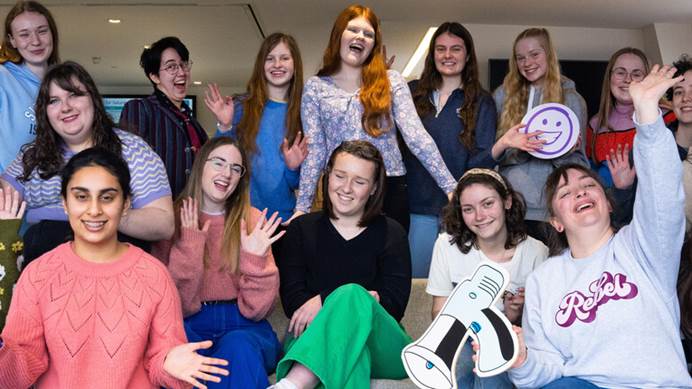Why we need more women in STEM
Without gender equality we’re limiting the potential for scientific breakthrough says Girlguiding advocate Alice
As a woman planning to begin a Civil Engineering degree apprenticeship in September, I'm passionate about equality in the STEM sector.
I want to be treated equally by the people I work with - and be seen as equally competent when compared to my male peers. Moreover, I firmly believe that without gender equality in the Science Technology Engineering and Maths (STEM) workforce we are limiting the potential for scientific breakthrough. This equality of opportunity and development of potential can only happen by breaking down gender stereotypes.
We need more female role models
When I think of inspirational people in STEM, I think of Albert Einstein, Alan Turing and my favourite, Brian Cox. These are, however, all men. 41% of girls aged 11-21 (Girls’ Attitudes Survey 2016) think that there are too few women role models working in STEM related careers. I would definitely agree; to find inspirational women you have to look much harder.
This prominence of men and apparent sexism in the STEM workplace is what discourages girls from perusing a career in STEM, continuing the gender gap. Personally, I worry about the potential for career development. The impression I get is that women are often passed over for promotions.
I want to make a difference in the world and I can’t if I am constantly being looked over.
Positive steps are being taken towards challenging stereotypes though. Tech is a massive part of today’s society, and social media is playing a huge part in this with women becoming more prominent in STEM through these mediums.
One of my favourite examples of women challenging STEM stereotypes is the 2016 film Hidden Figures, which looks at the lives of three black women working at NASA. It’s a film that has inspired many girls to enter the field. But, it also illustrates the difficulties that women face in a STEM workforce.
Above: Taraji P. Henson as NASA mathmetician Katherine Goble Johnson in the film Hidden Figures
In October, I did a week’s work experience in a civil engineering office where less that 20% of people in the office were women. Whilst I really enjoyed the week, it did illustrate to me how daunting and bold a decision it can be to decide to work in STEM.
I’ll be speaking out at London Tech Week
I am super excited to speak at London Tech Week on a fascinating panel of industry experts. We’ll be tackling questions around how to increase diversity in tech and looking at how stereotypes might unwittingly become embedded into the Artificial Intelligence (AI) tech being created.
What’s more I’m really pleased that they’ve invited a young woman to speak on the panel. This is because the issues that young women are facing now are different to anything that past generations have had to face. Listening to the opinions of those who are directly experiencing these issues is one of the most positive steps towards a more equal future.
What is AI? “Technically there’s no genuine AI yet because machines aren’t learning, evolving and autonomous - and don’t think separate from their code. But the example of Netflix queues being tailored for the individual is an example of a machine picking up on behavioural patterns and social cues.” - Alice
AI is a massively complex issue, and one that I have a lot of interest in. I wrote my extended project qualification (which I’m doing alongside my A-Levels) on the philosophy of how an AI might think. One of the most interesting questions is whether an AI creation will adopt the biases of its programmer. In a male dominated sector, what effect will this have?
Follow Alice at London Tech Week
Girlguiding Advocate Alice will be speaking on the TechXLR8 stage on 13 June (pm) as part of London Tech Week. Girlguiding will be live-tweeting from the event so follow us @girlguiding for the lowdown.



